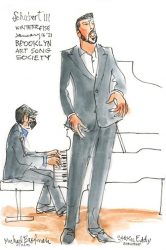 United States Brooklyn Art Song Society – Schubert III: Steven Eddy (baritone), Michael Brofman (piano), Brooklyn Art Song Society, Soapbox Gallery, Brooklyn. Livestream available from 16.1.2021. (RP)
United States Brooklyn Art Song Society – Schubert III: Steven Eddy (baritone), Michael Brofman (piano), Brooklyn Art Song Society, Soapbox Gallery, Brooklyn. Livestream available from 16.1.2021. (RP)

Schubert – Winterreise, Op.89, D.911
The Brooklyn Art Song Society’s 2020/21 season was planned long before anyone had heard of a virus that we would come to know as COVID-19. It was hardly unusual to schedule Schubert’s Winterreise during the winter months: no one could have foreseen that January 2021would bring suffering, isolation and disorientation for so many. This performance by baritone Steven Eddy and pianist Michael Brofman, however, conveys a subtle and unexpected message of hope.
The year before he died, Schubert composed this cycle of 24 songs that follow a desperate, love-sick young man’s trek across a bleak winter landscape. Suffering from syphilis, Schubert knew that most likely dementia, paralysis and an agonizing death would be his fate, but for three years the disease had been latent. Although sick in bed, four days before he died Schubert was correcting the proofs of the final 12 songs of Winterreise. Death came fast and unexpectedly to the 31-year-old composer, a relatively gentle release from life which he could hardly have expected.
For Winterreise, Schubert returned to the poetry of Prussian poet Wilhelm Müller, who was almost his exact contemporary. When Schubert first played the songs for his friends, they were dismayed at the pervasive pessimism. His response was, ‘I like these songs more than all the others, and you will come to like them also’. Time proved him right.

The performance by Eddy and Brofman is of the moment. Defiance coursed through their traversal of this monumental cycle: they raged not only on behalf of the weary wanderer but also, seemingly, at the present, when a pandemic has stilled life as we knew it. You sensed the injustice of their having to perform in an empty space to a camera rather than before a live audience. I have heard Winterreise many times, both in recital and on recordings, but never have I experienced a performance as fiery and bold as this one.
In his approach to Winterreise, Eddy has the advantage of youth: weariness and despair are tempered by impetuousness and passion. His voice is clean and true, whether lashing out in frustration, wallowing in self-pity or daring to dream. It is always beautiful, perhaps never more so than in ‘Wasserflut’, when he sang with lightness and delicacy at the thought of his torrent of tears warming as they flowed past the house of the woman he loved.
In Winterreise, Schubert made the pianist the singer’s equal in communicating the emotional depth of the songs. Brofman, who is the founder and artistic director of the Brooklyn Art Song Society, was no less daring and driven than Eddy in this performance. In ‘Erstarrung’, as the lad looks in the snow in vain for some memory of the girl he loved, his playing was urgent and angry. In ‘Die Krähe’, Brofman’s touch was as delicate and light as the soaring birds in flight. ‘Gefrorne Tränen’ was all the more heartbreaking for Brofman’s elegant, classical introduction which was martial-like in its precision.
In the accompanying introduction, Marjorie Hirsch, Professor of Music at Williams College, explored Schubert’s mindset and health as he immersed himself in this melancholy (or horrifying, as he once called it) poetry. Particularly interesting were her insights into the composer’s ability to paint words and images in music, which she described and illustrated through recorded examples.
For once, Winterreise left me hopeful rather than despondent. The vigor of the performance played its part, but so did the poetry and music experienced through the lens of today. This weary young man still had the emotional strength and resilience to rail against fate and the gods (bringing to mind ‘Prometheus’, another of Schubert’s great songs, set to a text by Goethe). Dare we to think that this forlorn wanderer, and we too, cannot only dream of but also experience the joys of spring that Schubert so beautifully depicted in ‘Frühlingstraum’.
This fine performance from the Brooklyn Art Song Society made me believe so.
Rick Perdian
To view Brooklyn Art Song Society’s Winterreise, click here.